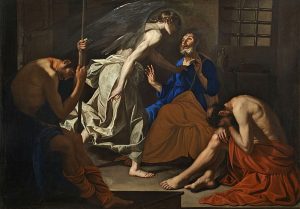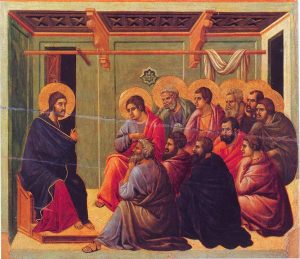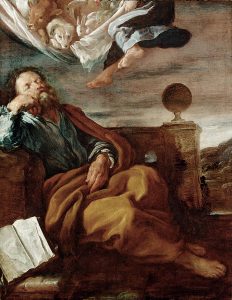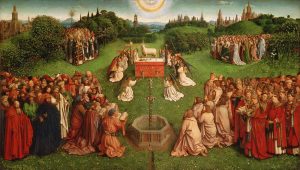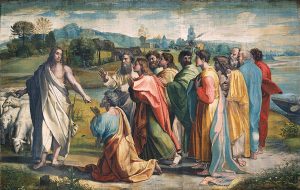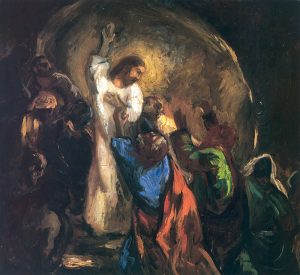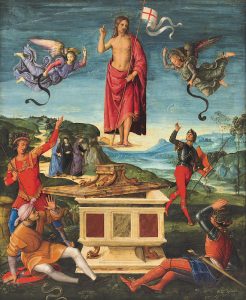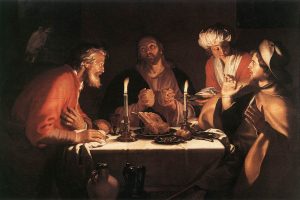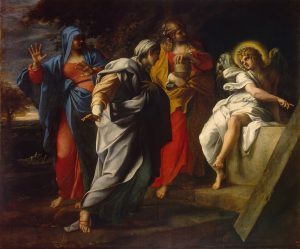Illuminations on the Lectionary readings for April 9, 2023 (Easter Sunday A – Principal Service)
First Reading: Jeremiah 31:1-6
It is Easter Day! Faith in Jesus’s resurrection on Sunday, the third day after his crucifixion, is at the very heart of Christian belief.
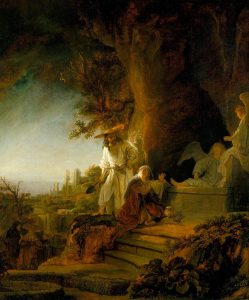
Christ and St. Mary Magdalene at the Tomb (1638), oil painting on panel by Rembrandt Harmenszoon van Rijn (1606-1669). Picture Gallery at Buckingham Palace, London. (Click image to enlarge)
We shout “alleluia” – literally “praise God” – on Easter Sunday as we celebrate the resurrection and its promise of victory over death. All of the Easter Sunday readings speak of renewed life and joy. In this first reading, the Prophet Jeremiah celebrates the people’s return to Jerusalem from exile in Babylon. The prophet imagines a joyful scene of dance and music, and looks forward to re-planting the land in new vineyards that will bear delicious fruit.
First Reading or alternate Second Reading: Acts 10:34-43
Happy Easter! Alleluia! We move forward with joy into the 50 days of Eastertide, a liturgical season that continues through Pentecost Sunday. Throughout the Easter season, our first readings will be taken from The Acts of the Apostles, the apostle Luke’s stories of the early church and how it grew. In this passage, which may be used alternatively as either the first or second reading for Easter, we see Peter touched by the Holy Spirit. He addresses an amazed crowd with a fluent sermon declaring the resurrected Christ as Messiah, fulfilling the prophecy attributed to King David in Psalm 16, and assuring us of our hope for eternal life through Jesus.
Psalm: Psalm 118:1-2, 14-24
If this Psalm portion sounds familiar, it should: It shares more than half of its verses with the Psalm we read last week for Palm Sunday. A celebration of the first Passover as the people fled Egypt ahead of Pharaoh’s wrath, it sings of joy and gratitude. Like the ancient Israelites, we are overjoyed at our salvation; we are delighted at this victory over death; and we are grateful for God’s goodness and mercy. God has heard our prayers and responded, laying a new cornerstone for a just world. This is the day that the Lord has made: Let us rejoice and be glad!
Second Reading: Colossians 3:1-4
Even in difficult times, Christ is with us, this short letter assures the persecuted Christians of Colossae in Asia Minor, the land now known as Turkey. Just as Jesus was raised from the dead, Christians are connected in baptism and raised through life in Christ, the author of this letter assures the people. The following verses urge the people to endure their difficulties with patience and the strength that comes from God’s glorious power expressed through Jesus – not in a long distant second coming but here and now.
Gospel: John 20:1-18
As important as the story of the empty tomb and the resurrection are to our Christian faith, each of the four Gospels nevertheless tells it in slightly different ways, much as eyewitnesses to any amazing event may remember different highlights. But one point is consistent in all four Gospels: Mary Magdalene was there. In this version from John, one of the two Gospels that may be read on this Easter Day, Mary is portrayed in beautifully tender verses as the only one who stayed at the empty tomb after everyone else left. There, to her joy and delight, she meets Jesus.
Alternate Gospel: Matthew 28:1-10
Just as multiple witnesses to any remarkable event often recall the details in conflicting stories, each of the four evangelists brings different details to their account of Jesus’s friends finding the empty tomb. In Matthew’s version, two women – Mary Magdalene and Mary – go to t the tomb alone. They find it empty, meet an angel in white and then encounter the risen Christ, who sends them to tell the other disciples the good news. The other synoptic Gospels, Mark and Luke, show them frightened, uncertain, running away in fear or running back to get the men. Only in Matthew’s Gospel do the women do it all, in fear and great joy.

